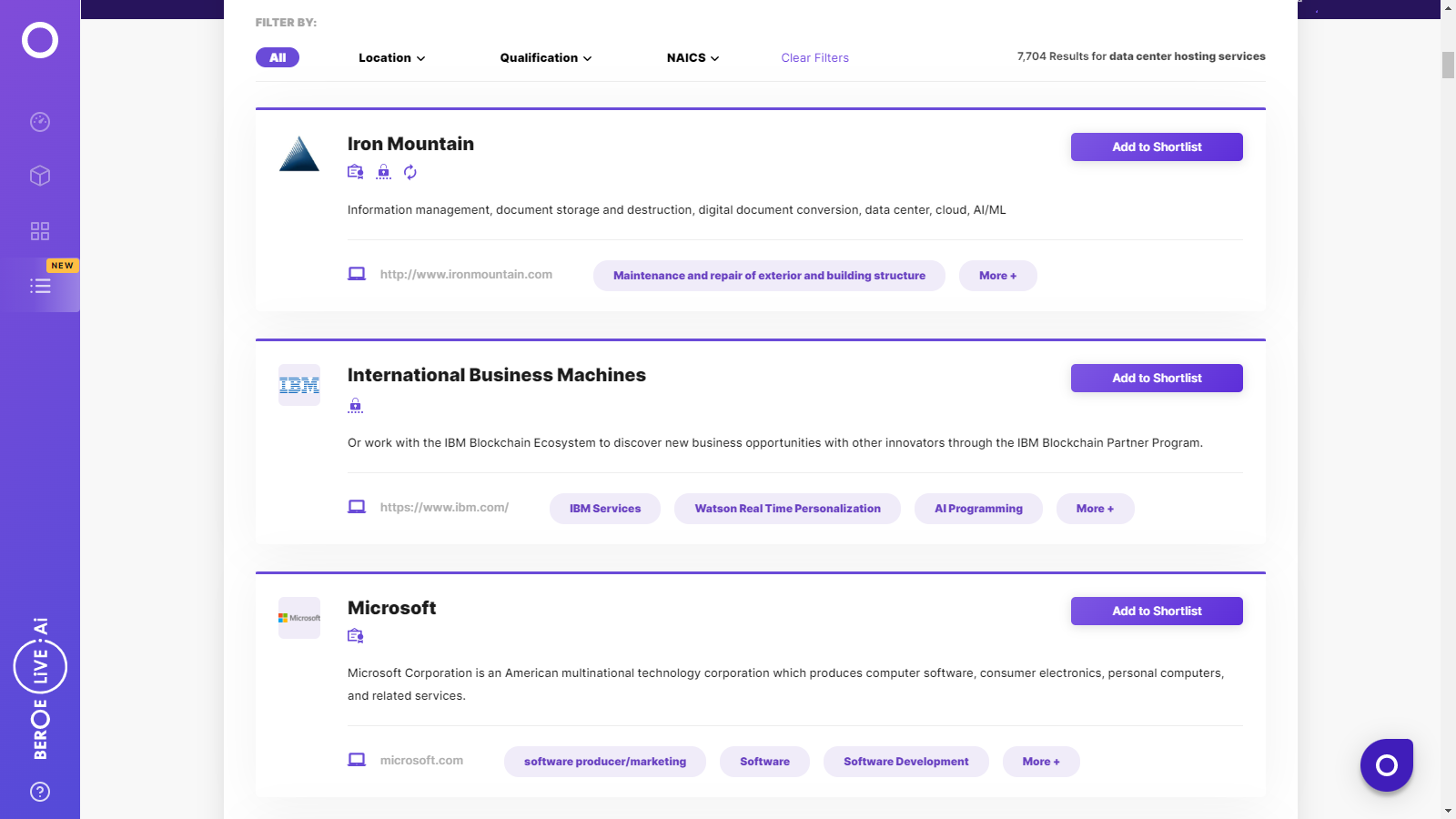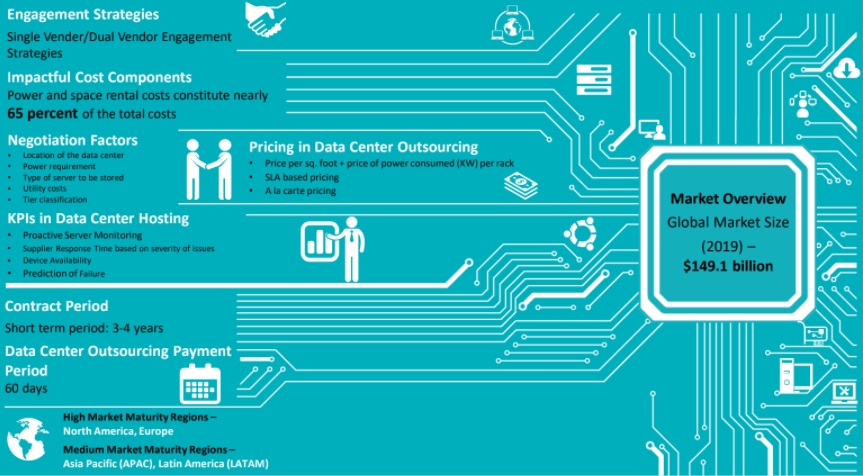CATEGORY
Data Center Hosting Services
Beroe LiVE.Ai™
AI-powered self-service platform for all your sourcing decision needs across 1,200+ categories like Data Center Hosting Services.
Market Data, Sourcing & Supplier Intelligence, and Price & Cost Benchmarking.
Schedule a DemoCategory Alerts
MetaEdge Launches Edge Data Center Platform in India
March 23, 2023HDC Launches New Containerized Data Center in the Maldives
March 23, 2023European Union Publishes Framework for Assessing Energy Efficiency of Data Centers
March 23, 2023Become a Beroe LiVE.Ai™ Subscriber to receive proactive alerts on Data Center Hosting Services
Schedule a DemoData Center Hosting Services Industry Benchmarks
Savings Achieved
(in %)
The average annual savings achieved in Data Center Hosting Services category is 5.50%
Payment Terms
(in days)
The industry average payment terms in Data Center Hosting Services category for the current quarter is 62.1 days
Compare your category performance against peers and industry benchmarks across 20+ parameters on Beroe LiVE.Ai™
Category Strategy and Flexibility
Engagement Model
Supply Assurance
Sourcing Process
Supplier Type
Pricing Model
Contract Length
SLAs/KPIs
Lead Time
Supplier Diversity
Targeted Savings
Risk Mitigation
Financial Risk
Sanctions
AMEs
Geopolitical Risk
Cost Optimization
Price per Unit Competitiveness
Specification Leanness
Minimum Order Quality
Payment Terms
Inventory Control
The World’s first Digital Market Analyst
Abi, the AI-powered digital assistant brings together data, insights, and intelligence for faster answers to sourcing questions
Abi is now supercharged with GPT4 AI engine. Enjoy the ease of ChatGPT, now on Abi
Data Center Hosting Services Suppliers

Find the right-fit data center hosting services supplier for your specific business needs and filter by location, industry, category, revenue, certifications, and more on Beroe LiVE.Ai™.
Schedule a Demo


Use the Data Center Hosting Services market, supplier and price information for category strategy creation and Quaterly Business Reviews (QRBs)
Schedule a DemoData Center Hosting Services market frequently asked questions
According to the industry analysis reports by Beroe, in 2019, the global data center outsourcing market was expected to grow at a moderate pace to reach a valuation of $105 billion.
According to the industry analysis reports by Beroe, in 2019, the global data center outsourcing market was expected to grow at a moderate pace to reach a valuation of $105 billion.
The global data center outsourcing market was driven by shrinking IT budgets, limited IT expertise, and increasing operational overhead within enterprises. The market growth is also driven by a rapid increase in virtualized infrastructure and cloud computing.
The global data center outsourcing market was driven by shrinking IT budgets, limited IT expertise, and increasing operational overhead within enterprises. The market growth is also driven by a rapid increase in virtualized infrastructure and cloud computing.
In highly regulated industries, data center co-location remains the top adopted segment in the market followed by the managed hosting market.
In highly regulated industries, data center co-location remains the top adopted segment in the market followed by the managed hosting market.
Some of the potential challenges faced by end-users are changing business needs, increasing complexities of network architectures, and fluctuating bandwidth.
Some of the potential challenges faced by end-users are changing business needs, increasing complexities of network architectures, and fluctuating bandwidth.
Some of the crucial negotiation factors in the data center hosting services industry are the location of the data center, power requirement, type of server to be stored, utility costs, tier classification.
Some of the crucial negotiation factors in the data center hosting services industry are the location of the data center, power requirement, type of server to be stored, utility costs, tier classification.
Proactive server monitoring, supplier response time based on the severity of issues, device availability, and prediction of failure are some of the KPIs in the data center hosting market.
Proactive server monitoring, supplier response time based on the severity of issues, device availability, and prediction of failure are some of the KPIs in the data center hosting market.
The different pricing models in data center outsourcing are ' ' Price per sq. foot + price of power consumed (KW) per rack ' SLA based pricing ' A la carte pricing
The different pricing models in data center outsourcing are ' ' Price per sq. foot + price of power consumed (KW) per rack ' SLA based pricing ' A la carte pricing
The high market maturity regions are North America and Europe, while the regions with medium market maturity are Asia Pacific (APAC), Latin America (LATAM).
The high market maturity regions are North America and Europe, while the regions with medium market maturity are Asia Pacific (APAC), Latin America (LATAM).
Equinix, Digital Realty, CenturyLink Inc., Level 3 Communications, Rackspace, Verizon, IBM, SunGard, NTT Communications, Navisite are the top players in the global data center hosting services market.
Equinix, Digital Realty, CenturyLink Inc., Level 3 Communications, Rackspace, Verizon, IBM, SunGard, NTT Communications, Navisite are the top players in the global data center hosting services market.
Data sovereignty is an important aspect for enterprises in order to act on the collection, usage, storage, and transmission of data within data centers (e.g. HIPAA, HITECH in the US). To manage data sovereignty issues better, enterprises can evaluate vendor capabilities to comply with the specific country's standards and control the physical location of the data.
Data sovereignty is an important aspect for enterprises in order to act on the collection, usage, storage, and transmission of data within data centers (e.g. HIPAA, HITECH in the US). To manage data sovereignty issues better, enterprises can evaluate vendor capabilities to comply with the specific country's standards and control the physical location of the data.
Every country imposes a set of standards and regulations (e.g. Environmental Protection Agency's Ozone Depleting Substance [ODS] rules) to ensure there is no risk of environmental damage and safety of workers from data centers. Failure to comply with the stated requirements can lead to fines, and in some cases, managers can be held personally liable for the violations.
Every country imposes a set of standards and regulations (e.g. Environmental Protection Agency's Ozone Depleting Substance [ODS] rules) to ensure there is no risk of environmental damage and safety of workers from data centers. Failure to comply with the stated requirements can lead to fines, and in some cases, managers can be held personally liable for the violations.
Data Center Hosting Services market report transcript
Global Data Center Hosting Services Market Outlook
-
The data center co-location market is expected to reach $120.62 billion by 2028, spurred by the shift towards colocation data centers by several companies and cloud service providers to significantly lower their IT infrastructural expenses
-
North America is the largest adopter of co-location services. In addition, Japan, China, and India would be leading countries in terms of number of data centers, driven by demand in IT, BFSI, telecom and social media sectors

Data Center Hosting Services Market Overview
-
In 2021, the global data center outsourcing market is projected to be at $201.13 billion and is expected to grow at the CAGR of 5.05 percent and reach $320.65 billion by 2028.
-
The growing demand toward infrastructure as a service (IaaS) in enterprises will reduce cost and improve productivity, acting as the primary factor for market growth
-
The market growth is also driven by a rapid increase in virtualized infrastructure and cloud computing
-
Changing business needs, increasing complexities of network architectures and fluctuating bandwidth are the potential challenges faced by end-users
Data Center Outsourcing – Trends
-
Co-location service providers are looking to improve market presence among large enterprises by bundling flexible contracts and differentiating themselves based on the value-adds provided for industry-specific deals
-
With the increasing adoption of remote working culture, cloud and latency have become a crucial factors, which enabling demand for data center facilities
Data Center Hosting Services Drivers and Constraints
Drivers
Flexible plans
-
Co-location and managed hosting vendors provide flexible payment structures, suited to every organization’s needs. For example, monthly payment conditions that allow customers to modify their colocation capacity in accordance with their hybrid IT strategy and only pay for space that is really needed
-
Enterprises can choose the plan depending on criticality of application and technical specification of device they propose to proceed with.
Minimal latency
- While the performance of devices is completely outsourced in a managed hosting model, enterprises need not worry about computing performance, or the latency involved.
Zero downtime
-
The hosting vendors make sure that servers, platforms and network infrastructure are constantly monitored and ensure that enterprises operate without any downtime.
-
Hiring and training an in-house team to manage data centers would prove to be expensive for enterprises.
Backup and security
-
Hosting vendors also make sure that data is backed up and safe, even in cases of technical failure or natural disasters.
-
Global hosting vendors are capable of securing data and ensuring they adhere to the security guidelines and regulations governing that region/industry.
Constraints
High cost
-
Vendors in the hosting space charge a high fee for managed hosting services, as they take care of end-to-end management activity of data center.
-
Organizations need to analyze the applications that should be co-located and managed in-house vs. completely outsourcing to a managed hosting vendor.
Reduced flexibility
-
Through managed hosting, organizations will have reduced control over the administrative access of servers. While for Colocation, enterprises would have restricted physical access, as the data center location is unlikely to be near the enterprise location
-
Enterprises will have to rely on the hosting provider every time for management activities of a data center.
-
As enterprises have ownership only of the data and not of physical device itself, they find it difficult to terminate current agreement with the vendor.
Interesting Reads:
Discover the world of market intelligence and how it can elevate your business strategies.
Learn more about how market intelligence can enable informed decision-making, help identify growth opportunities, manage risks, and shape your business's strategic direction.
Get Ahead with AI-Enabled Market Insights Schedule a Demo Now
